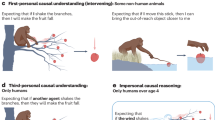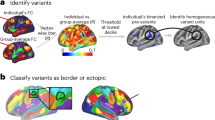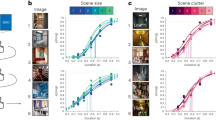A random scan is a quicker way to find items in a display than a systematic search.
Abstract
How swiftly can the object of your attention be changed? Consider two ways to deploy attention: it can be commanded from place to place by a deliberate act of will, or it can run freely without specific instruction. Here we use a visual search task to show that deliberate movement of attention is significantly slower because of an internal limit on the speed of volitional commands.
This is a preview of subscription content, access via your institution
Access options
Subscribe to this journal
Receive 51 print issues and online access
$199.00 per year
only $3.90 per issue
Buy this article
- Purchase on Springer Link
- Instant access to full article PDF
Prices may be subject to local taxes which are calculated during checkout

Similar content being viewed by others
References
Wolfe, J. M. in Attention (ed. Pashler, H.) 13–74 (Psychology Press, Hove, UK, 1998).
Noton, D. & Stark, L. in Perception: Mechanisms and Models–Readings from Scientific American (eds Held, R. & Richards, W.) 218 –227 (Freeman, San Francisco, 1971 ).
Horowitz, T. S. & Wolfe, J. M. Nature 394, 575–577 (1998).
Author information
Authors and Affiliations
Corresponding author
Rights and permissions
About this article
Cite this article
Wolfe, J., Alvarez, G. & Horowitz, T. Attention is fast but volition is slow. Nature 406, 691 (2000). https://doi.org/10.1038/35021132
Published:
Issue Date:
DOI: https://doi.org/10.1038/35021132
This article is cited by
-
What do we know about volumetric medical image interpretation?: a review of the basic science and medical image perception literatures
Cognitive Research: Principles and Implications (2019)
-
Can visual cognitive neuroscience learn anything from the philosophy of language? Ambiguity and the topology of neural network models of multistable perception
Synthese (2016)
-
Attention, consciousness, and the semantics of questions
Synthese (2014)
-
Visual Saliency with Statistical Priors
International Journal of Computer Vision (2014)
-
Probabilistic Multi-Task Learning for Visual Saliency Estimation in Video
International Journal of Computer Vision (2010)
Comments
By submitting a comment you agree to abide by our Terms and Community Guidelines. If you find something abusive or that does not comply with our terms or guidelines please flag it as inappropriate.



